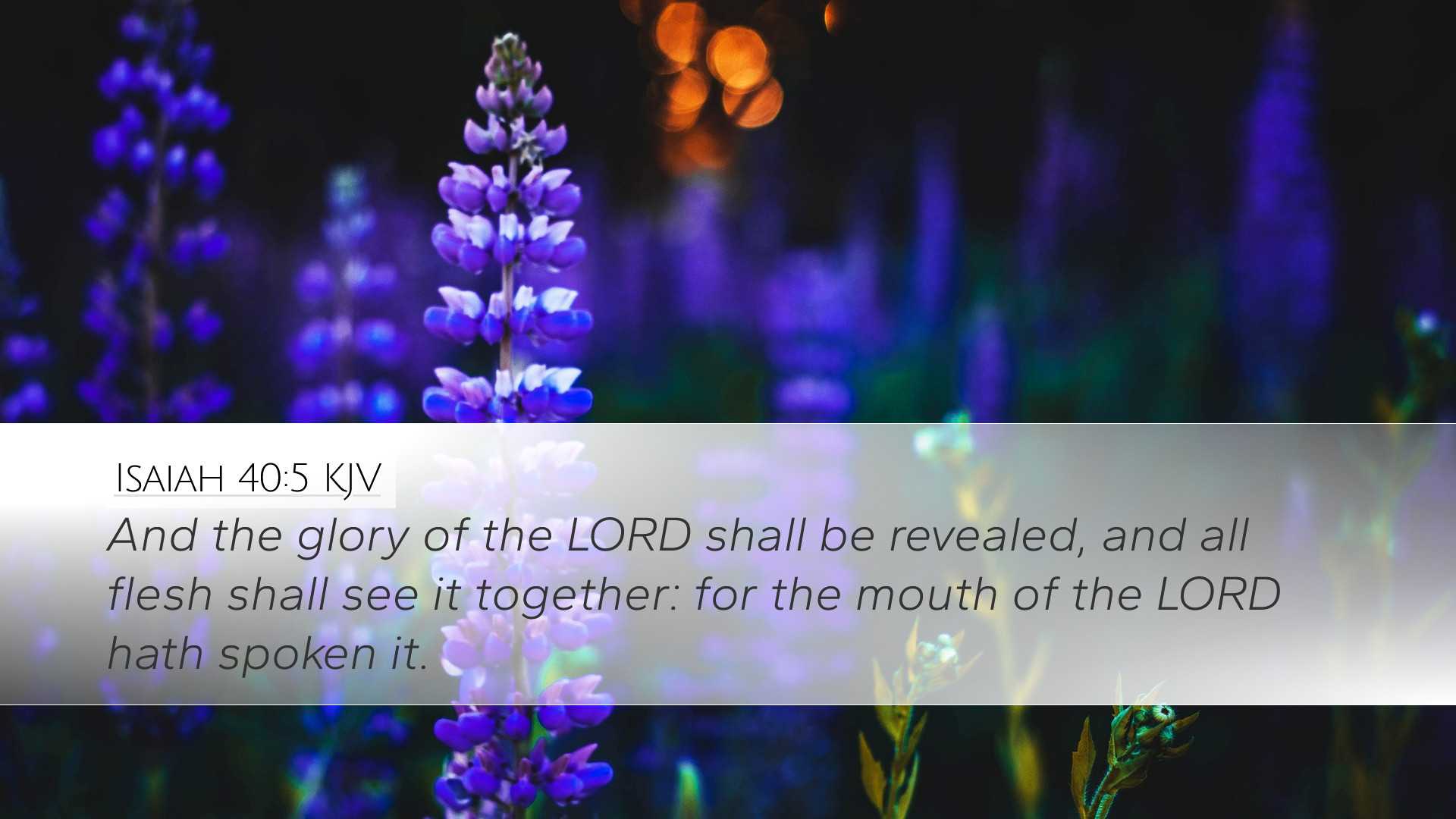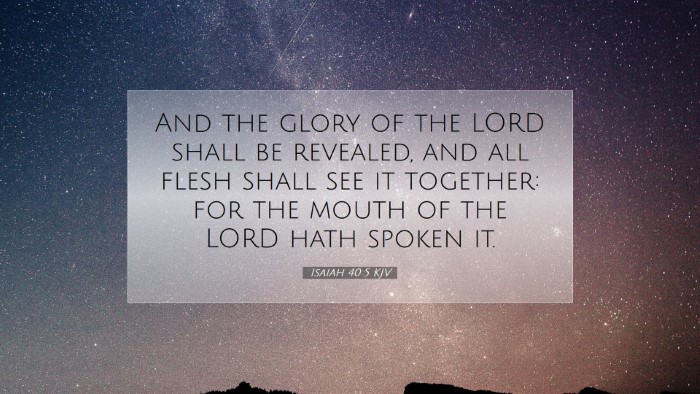Isaiah 40:5 - Commentary and Insight
Verse Text: "And the glory of the Lord shall be revealed, and all flesh shall see it together: for the mouth of the Lord hath spoken it."
Introduction
The passage of Isaiah 40:5 encapsulates a profound promise of divine revelation and glory. This verse invites us into the depths of theological reflection, unveiling God's plan for humanity and His ultimate purposes. In this commentary, we will draw insights from renowned public domain scholars such as Matthew Henry, Albert Barnes, and Adam Clarke, providing a rich tapestry of understanding for pastors, students, theologians, and Bible scholars.
Thematic Overview
This verse stands as a pivotal declaration within the context of Isaiah's prophetic message. It emphasizes the revelation of God's glory, a theme that resonates throughout Scripture. The unfolding glory of God signifies not only His magnificence but also His impending action among His people. The prophetic voice of Isaiah speaks a message of comfort and hope to a people in turmoil.
Divine Revelation
The phrase "the glory of the Lord shall be revealed" indicates a forthcoming manifestation of God's presence and splendor. Matthew Henry notes that this revelation is not merely for individual experience but is intended for “all flesh.” This universality highlights God’s inclusive plan for salvation and glory that extends beyond Israel, encompassing all humanity.
Universal Witness
Henry further emphasizes that "all flesh shall see it together," which portrays an image of collective recognition and worship. According to Albert Barnes, this communal sighting of God's glory suggests a time when divine truth will be perceived clearly and universally. This echoes the New Testament revelation where every knee shall bow before Him, signifying an acknowledgement of His sovereignty.
The Authority of Divine Speech
In the latter part of this verse, "for the mouth of the Lord hath spoken it," we find a powerful assurance of the reliability of God’s promises. Adam Clarke remarks on the significance of God's word as being immutable and certain. The assurance that God speaks underscores the prophetic nature of Isaiah's message – it's God who initiates this revelation, giving it authority and weight.
Contextual Analysis
Understanding Isaiah 40:5 also demands a contextual approach. This chapter marks the beginning of a section designed to comfort Israel, emphasizing God's redemptive plan following their period of judgment. The subsequent verses elaborate on God's might and His tender care, establishing a contrast between human frailty and divine strength.
Historical Context
During Isaiah’s time, the Israelites were exiled and facing despair. The promise of God's glory to be revealed was not merely eschatological but also immediate and transformational for the Jewish nation. Barnes notes that this declaration would serve to maintain hope in the face of adversity—reminding them that their suffering was temporary while God's glory is eternal.
Theological Implications
This verse not only speaks to the immediate audience but extends its implications for Christian theology. The revelation of God’s glory is fulfilled in Christ, who embodied this glory in the New Testament. Reflecting on this transition, Henry discusses how the full manifestation of God's glory is seen in Jesus Christ, who came to reconcile humanity to God, inviting all to a relationship with the Father.
Application for Life and Ministry
For pastors and theologians, Isaiah 40:5 provides a framework for teaching on God’s faithful nature and the importance of His revelation through Scripture. In ministry, this verse can encourage congregants to trust in the promises of God, emphasizing that His glory surpasses all trials and tribulations they may face.
Encouragement in Trials
In times of distress, believers can look toward God’s glory as a source of hope. Clarke remarks that this promise shouldn’t merely be viewed as a distant future event, but as a present reality which God continually invites His people to participate in. This perspective encourages believers to live in anticipation and expectation of God's active presence in their lives.
Call to Worship
The communal aspect of this verse serves as an invitation to worship. As all flesh sees God’s glory, it inspires a collective response of reverence and adoration. Churches may use this as a foundation to cultivate worship experiences that reflect God’s grandeur and majesty, recognizing that true worship involves the entirety of creation.
Conclusion
Isaiah 40:5 serves as a profound declaration of hope and assurance. The insights from Matthew Henry, Albert Barnes, and Adam Clarke provide a multifaceted understanding of this verse, enriching our theological landscape. As we consider God's promised revelation of glory, may we be reminded of His faithfulness and the invitation extended to all humanity to witness and respond to His glorious presence.


